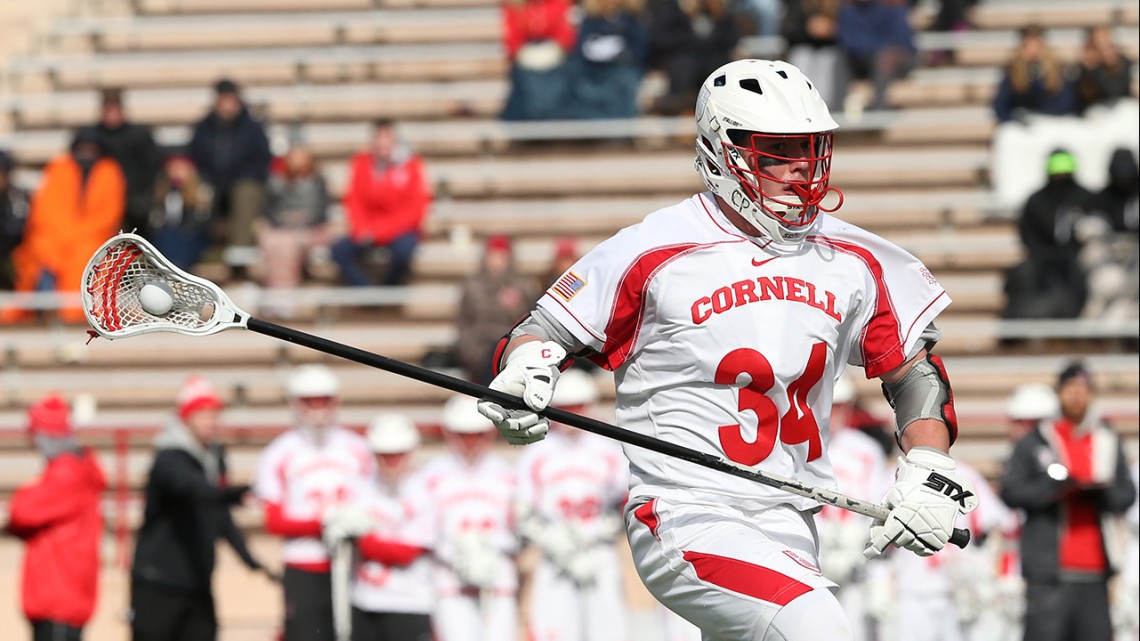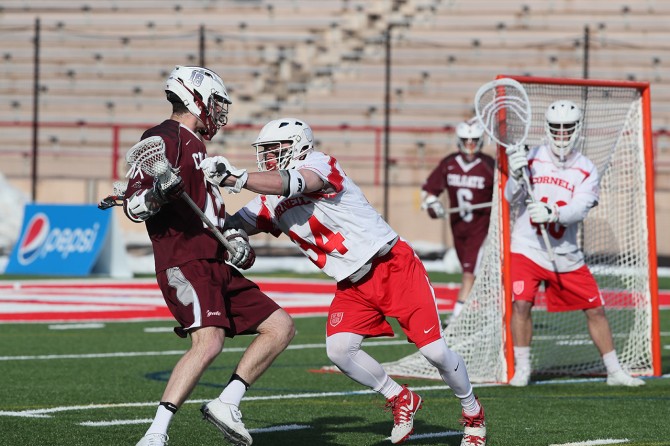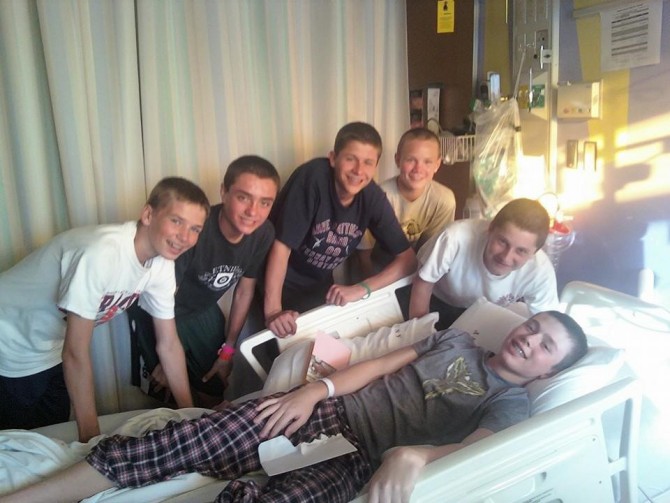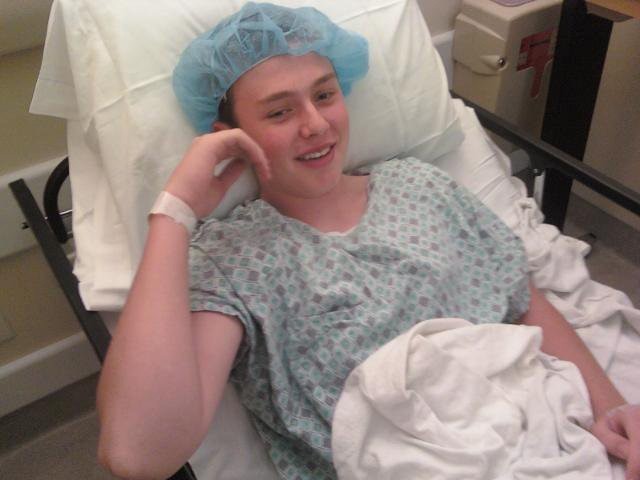
Jake Pulver '18 leads the defense for the Cornell men's lacrosse team.
Lacrosse player overcomes history of ailments to captain Big Red
By Julie Greco
For more than five years, Jake Pulver has saved a voicemail on his phone. The recording is short – just 50 seconds long – but its message looms large to this day.
“It was from my club lacrosse coach, Ric Beardsley,” says Pulver, “and it was just him saying that I should look at other schools because Cornell and the other Ivies didn’t want me.”
A month prior to receiving that voicemail, Pulver had attended the Cornell lacrosse program’s prospect camp, in hopes of getting recruited by the Big Red. Unfortunately for the Manlius, New York, native, the Cornell coaches weren’t interested in the undersized defenseman.
But Pulver knew something the Cornell coaches didn’t know.
The previous year, he had suffered through two serious digestive ailments, been hospitalized on five separate occasions, and endured two surgeries. His body was just beginning to come back, and he was determined to play Division I lacrosse.
“Cornell is where I always wanted to go,” says Pulver. “There was no second choice. So I just used that voicemail as motivation to try and get here.”
It worked: A two-time All-Ivy selection for Cornell, Pulver has been an integral part of the defensive unit from the moment he stepped on campus in fall 2014. Now in his second year as a team captain, he is one of 20 candidates for the national Senior CLASS award, which recognizes players’ achievement in community, classroom, character and competition
“It has been great to see Jake mature over the last few years,” says Jordan Stevens ‘15, Cornell assistant coach and one of Pulver’s former teammates. “In all honesty, I didn’t learn about his health history until after I graduated, but knowing Jake, I’m not surprised that he is able to be the outlier.
“I was lucky enough to play with some impressive leaders and workers in my time at Cornell,” Stevens added, “but Jake very well might be the most impressive.”
Unrelenting pain
Pulver’s problems began in the spring of his eighth-grade year. He was experiencing intense stomach pains, as if being “repeatedly stabbed in the stomach with a knife.” After several weeks with no relief, a trip to the doctor revealed that he had acute pancreatitis. He spent four days in the hospital on IV medication before being released on a strict diet.
But the pain in his stomach never subsided. He was losing a tremendous amount of weight – dropping from 140 to 115 pounds – and most concerning was the appearance of blood in his stool.
“My mom really felt like something wasn’t right,” said Pulver. “She started insisting that the doctors test me for other things, and four weeks before my freshman year I was diagnosed with ulcerative colitis. I had never heard of that, so I didn’t think it was any big deal. I just thought ‘Okay. Now we can fix it.’”
Ulcerative colitis is a bowel disease that causes inflammation and ulcers in the lining of the digestive tract. To treat the ailment, Pulver began a drug regimen that included taking 25 pills daily, along with the steroid prednisone.
With the usual drug regimens not working, Pulver’s doctors decided to treat him with Remicade, a drug administered through IV infusion.
“Each infusion took between 5 and 6 hours, but he was still trying to go to school and even as sick as he was he still made the basketball team,” says Pulver’s mother, Becky. “One time he had to go right from the Remicade treatment to a game and towards the end of the game we hear a ‘BOOM’ and I look over and it’s Jake on the ground. He just collapsed because his body gave out. But he never complained. He just got up and kept playing.”
Along with the toll that Remicade took on Pulver’s body, Becky also had concerns about the drug’s potential side effects – specifically the increased risk of lymphoma in teenage males. When the first round of Remicade didn’t help and the doctors suggested doubling the dosage by doing a treatment once every four weeks, she drew the line.
“The entire time that I was trying these drug treatments, my mom kept asking my doctors about the surgery [to remove the large intestine] to just get the disease out of me,” says Pulver. “After the Remicade didn’t work, my mom really pushed for the surgery.”
Becky, who continually sought out second – and third – opinions, connected with a surgeon willing to review her son’s colonoscopy. What he found confirmed her worst fears.
“The surgeon said that his colon was completely destroyed and needed to come out immediately because it was just cancer waiting to happen,” she says.
The road to recovery
On May 6, 2011, the day before his 15th birthday, Pulver had his large intestine removed. In mid-July he had a second surgery to remove the colostomy bag and reconnect his digestive system. Less than two months later, he was back in school and playing football.
“While I was sick, some of the doctors were saying that I shouldn’t play sports,” says Pulver. “Some told me that even after the surgery I may not be able to play sports again, but I knew that if I worked hard, I could still do what I loved. I wanted to keep my life as normal as possible. I didn’t want to have this disease affect me.
“When you do that, you let the disease win,” he says. “That entire year I tried to stay in school as much as possible. I wanted to hang out with friends. And I wanted to play sports.”
His recovery was astonishing. The disease, which robbed him of nutrients for more than a year, had stunted his growth. Pulver immediately began to grow, adding inches and much-needed weight. He began working out constantly and, by his junior year in high school, college coaches that had once passed on him began to take notice.
He went on to earn USILA All-America honors as a senior at Fayetteville-Manlius High School. Standing 6 feet tall and weighing 215 pounds, Pulver shows no sign of his 5-foot 6-inch, 115-pound former self, as he uses his size and strength to wear down the opponent’s top offensive threat.
Pulver still keeps that five-year-old voicemail. What once served as motivation is now a reminder of how far he has come.
“Going through that for 15 months or so was awful,” says Pulver. “But I would not be in the position I am today if it weren’t for that experience. It taught me a lot of things. I wake up in the morning and I may be tired and I may not want to go work out, but I just remind myself that I was in way worse circumstances at one time. In a way, I’m grateful that I went through that because it helped me learn to deal with adversity and stress. It really has made me who I am today.”
Julie Greco is deputy director of Athletic Communications.
Media Contact
Get Cornell news delivered right to your inbox.
Subscribe



